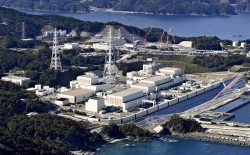Ishiba Cabinet Tries to Balance PM’s Ideas with Reality in 1st month; LDP Coalition’s Loss of Majority Poses Challenge

Prime Minister Shigeru Ishiba, left, and Ryosei Akazawa, minister in charge of economic revitalization, hold a sign for the “preparatory office” for the disaster prevention agency at the Cabinet Secretariat in Chiyoda Ward, Tokyo, on Friday.
15:41 JST, November 2, 2024
In the first month since its inauguration on Oct. 1, the Cabinet led by Prime Minister Shigeru Ishiba has been struggling to balance his cherished ideas with reality and has been unable to stabilize its management.
The coalition government of the Liberal Democratic Party and Komeito became minority ruling parties following their crushing defeat in the lower house election. It has thus become inevitable that opposition parties will intervene in the running of the administration, making it a challenge for Ishiba to realize his signature policies and maintain public support.
When questioned by reporters at the Prime Minister’s Office on Friday night about how he felt about his first month in office, Ishiba said, “It has been a month in which I hardly had time to catch my breath.”
Regarding his intentions going forward, he said, “I would like to run my administration carefully, humbly and responsibly for the nation.”
In anticipation of the House of Representatives election, which was considered the biggest hurdle in solidifying his support foundation within the LDP, Ishiba immediately after taking office refrained from putting forward the assertions he had made during the LDP presidential election in September.
He had earlier indicated his intentions to hold a Budget Committee meeting at the extraordinary Diet session before dissolving the House of Representatives. But in an apparent bid to leverage the momentum gained from the LDP presidential election, Ishiba did not hold the meeting, despite requests from opposition parties.
Meanwhile, Ishiba made his diplomatic debut at ASEAN-related summit meetings held just after the lower house was dissolved. During his meetings with other countries, however, he did not touch on his ideas of creating an Asian version of the NATO or of revising the Japan-U.S. Status of Forces Agreement.
Ishiba had seemingly resolved to take a pragmatic approach so as to fulfill his responsibilities as prime minister. But the opposition parties criticized him as “having deserted his cause,” while others said that “the essence of Ishiba has been lost.”
Going forward, Ishiba intends to focus his efforts on realizing his signature policies.
Ishiba inaugurated on Friday a “preparatory office” in the Cabinet Secretariat for the establishment of a “disaster prevention agency,” one such signature policy.
He has also established a “headquarters for the creation of new regional economies and living environments” designed to propel regional revitalization, and a ministerial meeting tasked to improve the treatment of Self-Defense Forces personnel, in an effort to spur on the realization of his policies.
However, as the ruling coalition of LDP and Komeito have lost their majority in the Diet, they have become forced to accept policy requests opposition parties, such as the Democratic Party for the People, may present.
A senior government official said, “The Prime Minister’s Office could become a subcontracting organ that merely carries out the policies it is told to implement.”
In an emergency nationwide opinion poll conducted by The Yomiuri Shimbun on the heels of the lower house election, the number who called for Ishiba to step down as prime minister was far fewer than those who said his resignation was not called for.
A source close to the prime minister said, “We hope to regain people’s expectations by adopting even the opposition parties’ requests, if necessary, and by continuing to realize policies that will improve people’s lives.”
Related Tags
Top Articles in Politics
-

Japan PM Takaichi’s Cabinet Resigns en Masse
-

Sanae Takaichi Elected 105th Prime Minister of Japan; Keeps All Cabinet Appointees from Previous Term
-

Japan’s Govt to Submit Road Map for Growth Strategy in March, PM Takaichi to Announce in Upcoming Policy Speech
-

LDP Wins Historic Landslide Victory
-

LDP Wins Landslide Victory, Secures Single-party Majority; Ruling Coalition with JIP Poised to Secure Over 300 seats (UPDATE 1)
JN ACCESS RANKING
-

Japan PM Takaichi’s Cabinet Resigns en Masse
-

Japan Institute to Use Domestic Commercial Optical Lattice Clock to Set Japan Standard Time
-

Israeli Ambassador to Japan Speaks about Japan’s Role in the Reconstruction of Gaza
-

Man Infected with Measles Reportedly Dined at Restaurant in Tokyo Station
-

Man Infected with Measles May Have Come in Contact with Many People in Tokyo, Went to Store, Restaurant Around When Symptoms Emerged


















